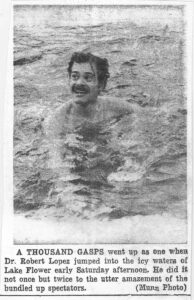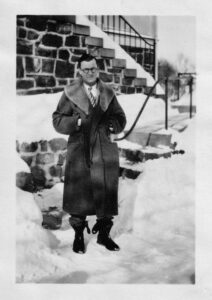Thanks, coach
“He was once asked what the most important requirement was if you wanted to become a successful hockey coach. He replied: “‘Being able to drink really bad coffee.'”
— Fredrick Backman, “Beartown”
Bad coffee. Early morning bus trips. Wet socks. Sleepless nights. These realities are not glamorous.
My husband Bill is a coach. When I say this, I am not just referring to a volunteer or paid job. Rather, if he were to peer into a mirror that would reflect his essence, one word would appear. Coach.
Whether it’s teaching, parenting or working with a team, Bill is at his best when he is coaching. Last week, the Saranac Lake School District honored him by inducting him into their Hall of Fame. It was an honor well-earned and, like most awards, centered around tangible achievements. In this case, winning the cross-country state championships in 2018 and 2019, while placing second in 2022.
By nature, sports are competitive, so the win/loss record becomes the focus for either accolades or derision. But, as my husband would say, “Sometimes you just don’t have the horses.” For those teams, success is measured by improvement. And improvement doesn’t happen by accident.
Though cross country is a fall sport, by April, he is reading new training programs and examining old workouts. Flat surfaces look like they’ve been littered with freshly fallen snow — envelopes and paper scraps decorated with scrawled names, times and VO2 max calculations.
If the sport of the season is hockey, new line configurations and practice drills join the paper drifts. Evenings will find him in what my daughter Chloe calls his coaching “encampment: a white card table paired with cheaters, paper, pencil and calculator.” Yankees Classics may be playing in the background, but he can’t tell you the game’s score.
As deserving as he is of this honor, Bill isn’t alone. He simply lives the life of a dedicated coach, of whom I can name several. They are the ones who intuitively know what each team needs.
One moment, the need might be a vein-popping “motivational speech,” and the next, it might be gentle comfort. They pack an extra uniform, a repair kit and a first aid kit, but also carry the weight of each athlete’s hopes and dreams. So much coaching happens behind the scenes, long before the athletic event.
This leads to the golden rule of being the wife: never talk to the coach on competition day. Every routine, practice and plan has been crafted for this brief moment. Instead, I’ve learned to sit back and be entertained, if not by the game, by the coaching antics.
I smile at the disco roll hands, synonymous with “move your feet” in every sport. I listen for the catchphrase, “Be uncomfortable,” which quickly became a meme. And I chuckle when fate tempers the intensity of the moment, like in a hockey game where his pants seams split, as he demanded, “Show me the rule!” after a questionable call.
As spectators, it’s easy to be sucked into the emotional side of competition. We want our kids to excel and our teams to win. When inevitably this doesn’t happen 100% of the time, it’s easy to criticize. Just remember: no one goes into coaching for fame or money. Instead, they are motivated by the belief that they can inspire a player to see and work toward their potential.
The time commitment, the hard work and the emotional investment are far more than most people realize. The payoff comes in seeing athletes succeed, as well as an occasional, “Thanks, coach.”
And sometimes, if they are lucky, they are rewarded with merited recognition in addition to their bad cups of coffee.




